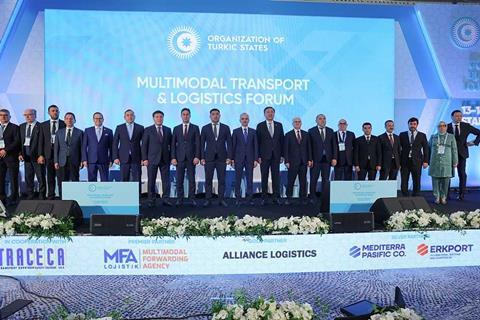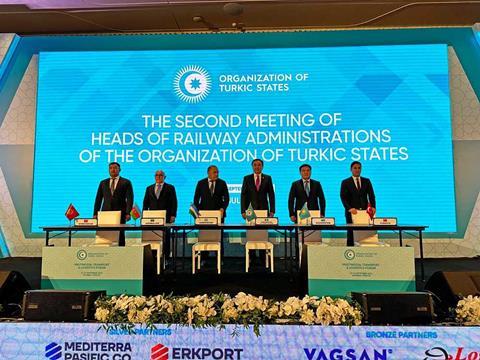
ASIA: The national rail operators of the five member states of the Organization of Turkic States — Turkey, Azerbaijan, Kazakhstan, Uzbekistan and Kyrgyzstan, plus observer state Turkmenistan — met to discuss the potential for increasing rail freight traffic and boosting the Middle Corridor transit route at the first OTS Multimodal Transport & Logistics Forum held in Istanbul on September 13-14 .
Newly appointed Minister for Transport & Infrastructure Abdulkadir Uraloğlu said Turkey is ‘very focused’ on increasing rail freight between OTS members, and was at the last stages of concluding agreements with several of them.
Already implemented is an online e-permit system with Uzbekistan allowing instant online access to customs documentation, which he expects to support a 10-fold increase in rail freight between the two countries. Turkey plans to implement similar systems with other trading partners.
Uraloğlu added that Turkey was working closely with Azerbaijan to fulfil the potential of the long mooted Zangezur Corridor, and is also trying to reopen a rail corridor from Turkey to Iraq’s port of Basra.
The first session of the forum saw senior officials from the rail operators of the six states explain what they have been doing to grow rail shipments and outline their plans for further expansion.
Igbal Huseynov, Deputy Chairman of national railway ADY, said Azerbaijan’s geographical position makes it ‘the key’ to the Middle Corridor route. He suggested that OTS needs a common road map outlining the steps to be taken by all six member states.
Anuar Akhmetzhanov from the strategy board for Kazakhstan Temir Zholy reported a big increase in rail freight between Kazakhstan and its neighbours. Traffic to Russia had tripled during the first eight months of 2023, after increasing five-fold in 2022.
He said Kazakhstan had three major challenges to overcome to raise throughput on the Middle Corridor:
- infrastructure bottlenecks, which an EBRD report suggests will require investment of €20bn to overcome;
- a shortage of rolling stock, which KTZ has begun to address with the purchase of 100 wagons this year;
- soft barriers such as customs formalities, which he suggested could be resolved by the six states working together to eliminate unnecessary red tape.
Azamat Sakiev, head of national railway KTJ, said Kyrgyzstan had been working on a project for a new transit railway linking its eastern neighbour China with its western neighbour Uzbekistan.
Trains would run from China to Europe via Kyrgyzstan, Uzbekistan, Turkmenistan, Iran and Turkey instead of via Kazakhstan and Russia, shaving 900 km and eight days off the journey time. With a feasibility study completed in 2021 and tripartite agreements signed, the three countries are now working on a financial model for the 523 km line, of which 260 km would be inside Kyrgyzstan. Active development is expected to start next year.
Zufar Narzullaev, Chairman of Uzbekistan’s UTY, confirmed plans to participate in the link from China, which would require the construction of 50 km of new alignment in Uzbekistan. He also confirmed UTY’s interest in a rail link to the Indian Ocean via Afghanistan and Pakistan for which protocols had been signed.
Narzullaev also explained that Uzbekistan has begun producing its own 100% Uzbek-made wagons.
Ufuk Yalcin, Chairman & CEO of Turkey’s TCDD, pointed out that of the six OTS member states, only Turkey operates the same 1 435 mm track gauge as Europe. Turkey is currently engaged in rebuilding the line from Istanbul to Bulgaria, which he explained would play a vital role as the western end of the Middle Corridor.

The forum was followed by the second round-table meeting of the heads of railway administrations of OTS. There were discussions on the establishment of alternative cost-effective international railway corridors through member states and an agreement for them to continue joint efforts to increase rail freight volumes.
- On September 19 Azerbaijan’s state media announced that the European Investment Bank’s Eastern Partnership Investments in Connectivity programme was participating in a project implemented by the Ministry of Digital Development & Transport aimed at bringing EU experience to support Azerbaijan’s rail sector. The aim is to reach European standards and to enhance the transit potential of Azerbaijan and the Middle Corridor.

















